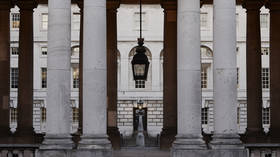Britain’s left-leaning academics are building campus echo chambers by shutting down fellow scholars’ dissent

New research confirms what we already suspected: that opinions on the political right, and those holding them, aren’t welcome in UK universities, where curriculum cancel culture is rife and deplatforming’s the name of the game.
A new report by the UK-based centre-right think tank Policy Exchange has cast a spotlight on a sinister trend across Britain’s venerated and historic universities. These institutions are supposed to be beacons of open-minded debate and forthright discussion. The leaders of tomorrow go there to partake in a rigorous examination of all opinions and then to opt for whichever strikes a chord. But, these days, it’s the left-leaning liberal opinion that’s being heard louder and more often.
The research is based on the views of academics working inside the universities, and the split is clear: 75 percent of them voted Labour/Lib Dem/Green in the past two general elections, while fewer than 20 percent cast their vote for the right.
The academics’ political views are not of greatest concern – but the fact that 54 percent admit to feeling uncomfortable even sitting next to a Leave voter at lunch is. If that statistic was repeated across racial borders, we’d be back in Rosa Parks territory. And if an academic won’t even eat a sandwich with a colleague because they can’t see past their politics, what are they doing to students who disagree?
It’s no wonder that 44 percent of those identifying their views as “fairly right” and 63 percent of the “very right” reported a “hostile climate” in their respective departments. And 32 percent of them felt the need to self-censor, compared to only 15 percent of those in the centre or on the left.
The raw figures are bad enough, but the compound effect is downright dangerous. A known Leave supporter applying for a position at a university faces a one-in-three chance of being discriminated against by a three-person panel, rising to 80 percent if there’s a four-person panel. For the opposing side, in contrast, the figures are one in 20 and only a 17 percent chance of facing discrimination. The message is stark: don’t spout your horrible, racist, ring-wing views – and if you do, don’t expect to get either support or promotion.
Compared to the first-past-the-post electoral system – which throws up injustices such as in 2015, when the UK Independence Party won 3.8 million votes in exchange for a single seat in the House of Commons, whereas the Scottish National Party took 56 seats with 1.4 million votes – Brexit was the “most” democratic vote Britain has ever seen. It was one-person, one-vote, with Leave coming narrowly out on top. Yet Brexit supporters are regarded as swivel-eyed loons. What gives a liberal clique the right to set that trend? Britain has wandered further into the abyss that many countenance.
Earlier this year, former Home Secretary Amber Rudd was asked to speak at the University of Oxford to mark International Women’s Day. However, she was deplatformed with only 30 minutes’ notice. Safa Sadozai, from Oxford’s Feminist Society, said: “Many people here were saying she is not entitled to be celebrated or upheld as a feminist.” A ridiculous response if there ever was one. Politics has long been a male-dominated sphere, but Rudd was in parliament for almost a decade, carrying out various cabinet roles. She was also part of a committee that led the government’s response to the issue of female genital mutilation, and, despite being a Tory, openly campaigned against Brexit. Moreover, she’s a long-time director of the Susan Smith Blackburn Prize – an annual award for first-time female playwrights. Alongside all that, she raised two children. So, if anyone has a view worth hearing on feminism in Britain, Rudd must be their equal.
A trend from across the pond
That crude stunt at Oxford echoed what’s going on in the US, where an anonymous black professor at the University of California, Berkeley penned an open letter to colleagues explaining how he felt forced to back Democratic Party polices and agree with the Black Lives Matter (BLM) movement. He was frustrated that he couldn’t air his honest opinions without fear of reprisals.
In another instance, Rutgers University’s chair of English, Rebecca L Walkowitz, sent an email to colleagues requesting that, in the wake of BLM, they should encourage students “to push against biases based on written accents”. It appeared to suggest that, for fear of wandering into a racial minefield, they should accept poorer grammar or less well-constructed work.
These examples come on the heels of numerous occasions when appearances by conservative speakers have been sabotaged by student protests. And such incidents are only becoming more common. Cancel culture isn’t being wantonly splashed across the curriculum; it’s being deliberately dropped on certain pockets of it.
Also on rt.com American university students are coddled, thin-skinned snowflakes, and social media is to blameGoing to university used to be a way to pull yourself up a rung, the education you received enabling you to see the world in technicolour. It unquestionably led to more tolerant views, a greater understanding of society and a more knowledgeable population. Now, that’s not as certain. These days, it’s only a good idea to take a university course if you’re happy to succumb to left-wing indoctrination. And if you don’t subscribe to those views, you’ll either need to remain in the closet or accept that you’ll be ostracised.
Do these liberal academics realise they’re paying homage to the world’s dictators and propaganda machines by refusing to accept non-compliance? After all, imitation is the sincerest form of flattery.
The statements, views and opinions expressed in this column are solely those of the author and do not necessarily represent those of RT.














